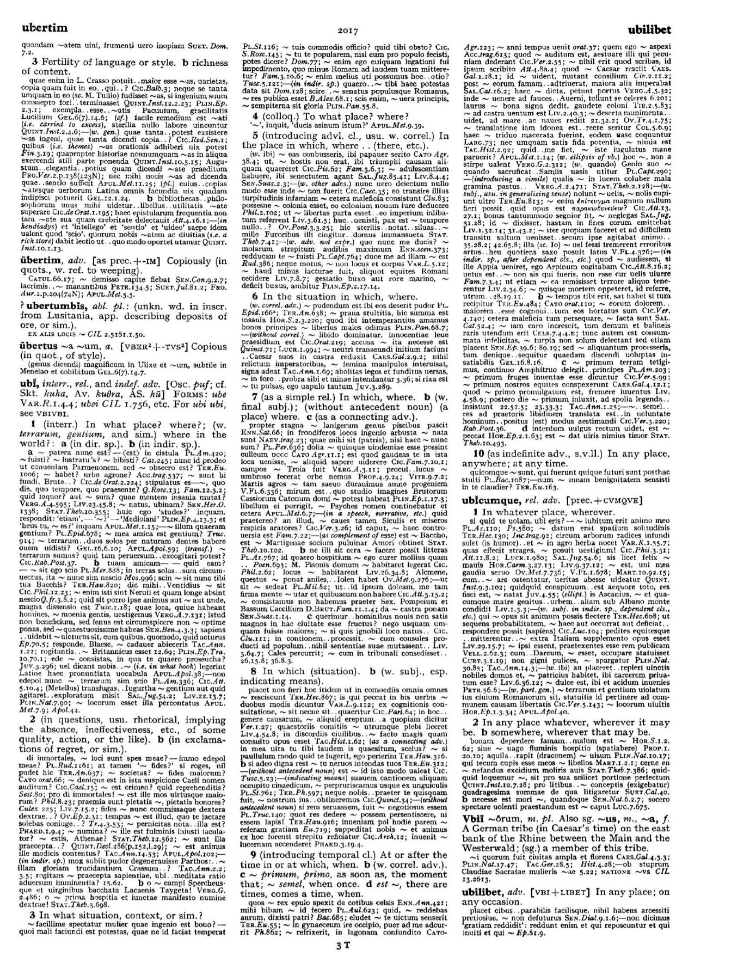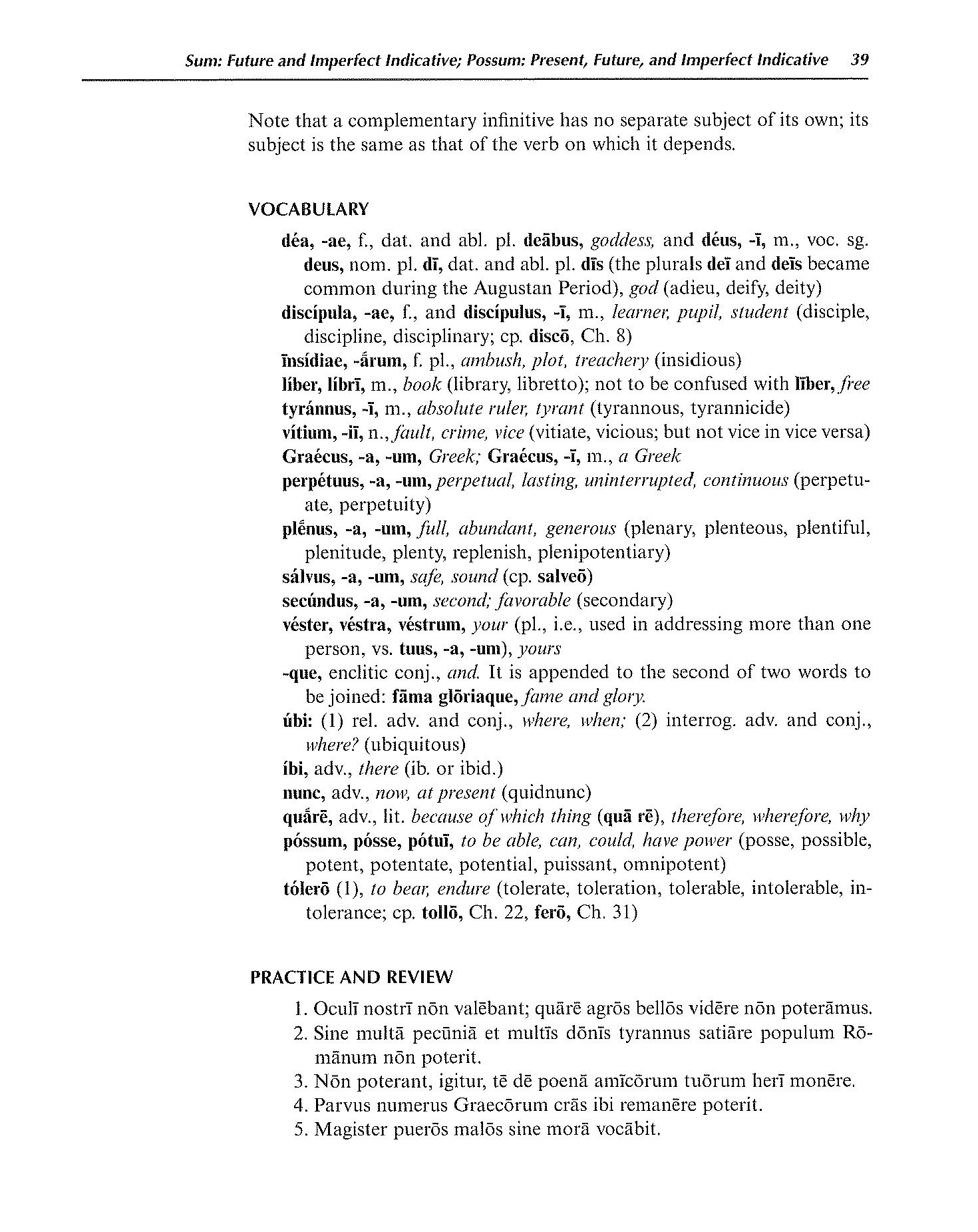
page_listing.tpl
page_subListingDetails.tpl
sub_listingDetails_style1.tpl
sub_listingDetails.title.tpl
ubī where
ubī is a Latin Adverb that primarily means where.
Definitions for ubī
Wheelock's Latin
Adverb
- 1
rel. adv. and conj., where, when
- 2
interrog. adv. and conj., where?
English derivatives:
ubiquitous
Oxford Latin Dictionary
Adverb
- 1
(interr.) In what place? where?; (w. terrarum, gentium, and sim.) where in the world?; (a) (in dir. sp.). (b) (in indir. sp.).
- 2
(in questions, usu. rhetorical, implying the absence, ineffectiveness, etc., of some quality,action, or the like). (b) (in exclamation of regret, or sim.)
Sentences with ubī
Latin to English
Ubi tyrannus est, ibi virī nōn possunt līberī.Compare Where (there) is a tyrant, there men cannot be free.
Ubi sunt trēs novī amicī quōs in urbe vīdistī?Compare Where are the three new friends whom you (sg.) saw in the city?
Ubi sunt tria corpora quae ā tē ibi inventa sunt?Compare Where are the three bodies which were found there by you (sg.)?
Ubi dux est (fuit)?Compare Where is (was) the leader?
Rara temporum felicitate, ubi sentire quae velis, et quae sentias dicere licet. [Historae, I,1]Compare The rare happiness of times when we may think what we please, and express what we think.
Etiam in pictūrā est vīlla rūstica ubi Cornelia aestāte.Compare Also in the picture is the country house and farm where Cornelia lives in summer.
Quare iste, ubi tu nascor, plus amo posthac locus.Compare Wherefore I shall henceforth love still more this place, where you were born.
Beneficia eo usque laeta sunt, dum videntur exsolvi posse; ubi multum antevener, pro gratia odium redditur.Compare Benefits received are a delight to us as long as we think we can requite them; when that possibility is far exceeded, they are repaid with hatred instead of gratitude.
Data sources
Notes
- Definitions
- Frederick M. Wheelock, Wheelock's Latin, 6th ed., rev. Richard A. LaFleur (New York, NY: HarperCollins Publishers, 2005): 39.
- P. G. W. Glare, Oxford Latin Dictionary, Vols. 1-8 (Oxford: Clarendon Press, 1982): 2017.
- Word frequencies
- Christopher Francese, "Latin Core Vocabulary," Dickinson College Commentaries, last modified 2014, http://dcc.dickinson.edu.
- Paul B. Diederich, The Frequency of Latin Words and Their Endings, PhD diss., (Columbia University, 1939).
- Louis Delatte, Suzanne Govaerts, Joseph Denooz, and Etienne Evrard, Dictionnaire fréquentiel et index inverse de la langue latine [Frequency Dictionary and Inverse Index of the Latin Language] (Liège, Belgium: Laboratoire d'analyse statistique des langues anciennes de l'Université de Liège [L.A.S.L.A.], 1981): 122.
Bibliography
Allen, Joseph H. Allen and Greenough's New Latin Grammar for Schools and Colleges: Founded on Comparative Grammar. Edited by James B. Greenough, George L. Kittredge, Albert A. Howard, and Benjamin L. D'Ooge. Boston, MA: Ginn & Company, 1903.
Crystal, David. A Dictionary of Linguistics and Phonetics. 6th ed. Oxford, UK: Blackwell Publishing, 2008.
Delatte, Louis, Suzanne Govaerts, Joseph Denooz, and Etienne Evrard. Dictionnaire fréquentiel et index inverse de la langue latine [Frequency Dictionary and Inverse Index of the Latin Language]. Liège, Belgium: Laboratoire d'analyse statistique des langues anciennes de l'Université de Liège (L.A.S.L.A.), 1981.
Diederich, Paul B. The Frequency of Latin Words and Their Endings. PhD diss., Columbia University, 1939.
Francese, Christopher. "Latin Core Vocabulary." Dickinson College Commentaries. Last modified 2014. http://dcc.dickinson.edu/latin-vocabulary-list.
Gildersleeve, Basil L., and Gonzales Lodge. Gildersleeve's Latin Grammar: Third Edition, Revised, and Enlarged. 3rd ed. London, England: Macmillan and Co., 1903.
Glare, Peter G.W. Oxford Latin Dictionary. Vols. 1-8. Oxford, England: Clarendon Press, 1982.
Krüger, Bernd. "Latin Conjugation Tables." Cactus2000. Accessed May 5, 2023. https://latin.cactus2000.de/index.en.php.
Pierson, Nick. "Sound of Text." Accessed October 26, 2019. https://soundoftext.com.
Wheelock, Frederick M. Wheelock's Latin. 6th ed. Revised by Richard A. LaFleur. New York, NY: HarperCollins Publishers, 2005.
Wiktionary Contributors. "Victionarium." Wikimedia Foundation, Inc. Updated March 18, 2019. https://la.wiktionary.org/wiki/Victionarium:Pagina_prima.
Citation
Chicago (17th ed.)
Allo Contributors. "ubī (adv.) - Latin Word Definition." Allo Latin Dictionary. Last modified . Accessed February 19, 2026. http://ancientlanguages.org/latin/dictionary/ubi.
Entry created on . Last updated on .







